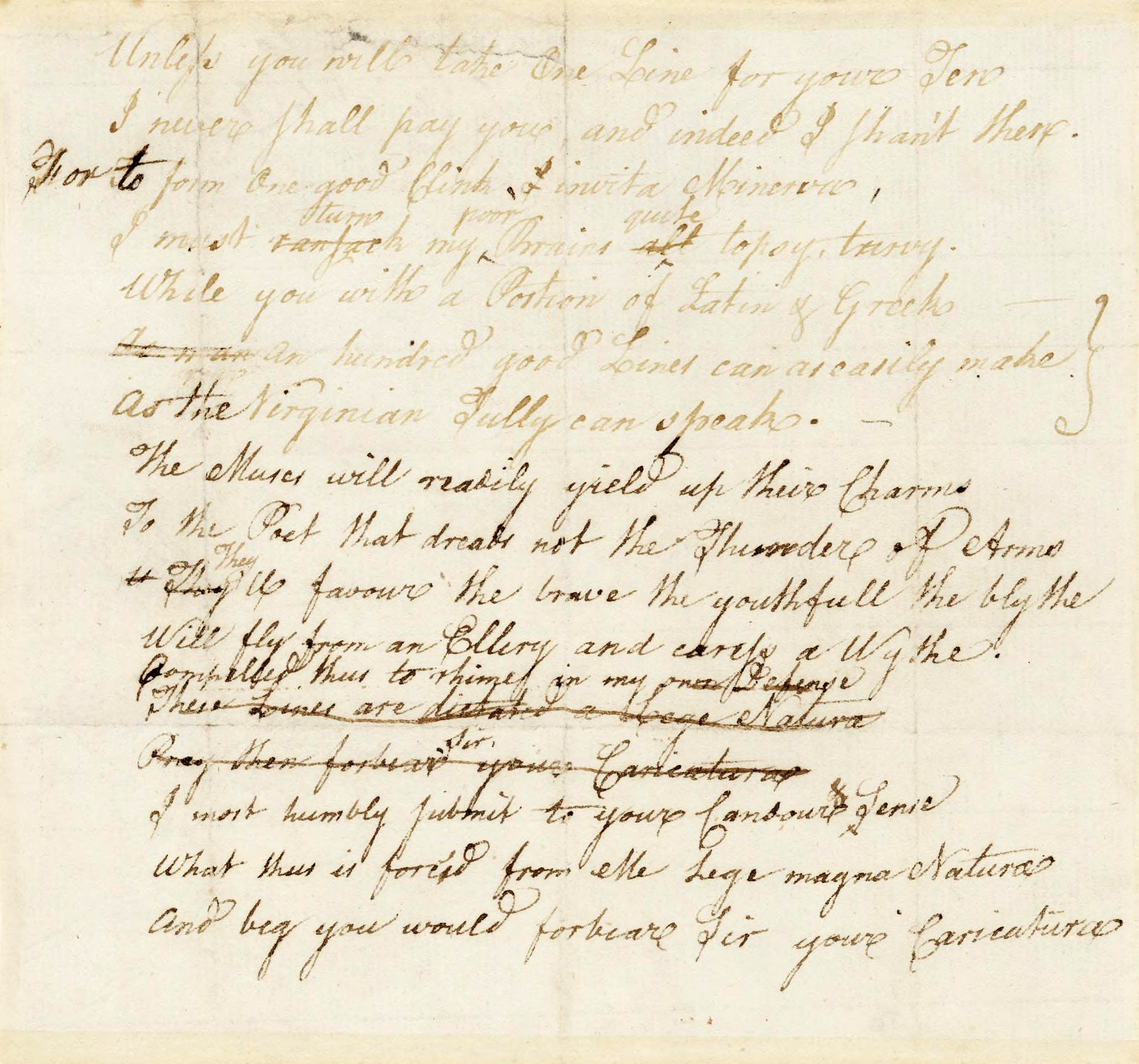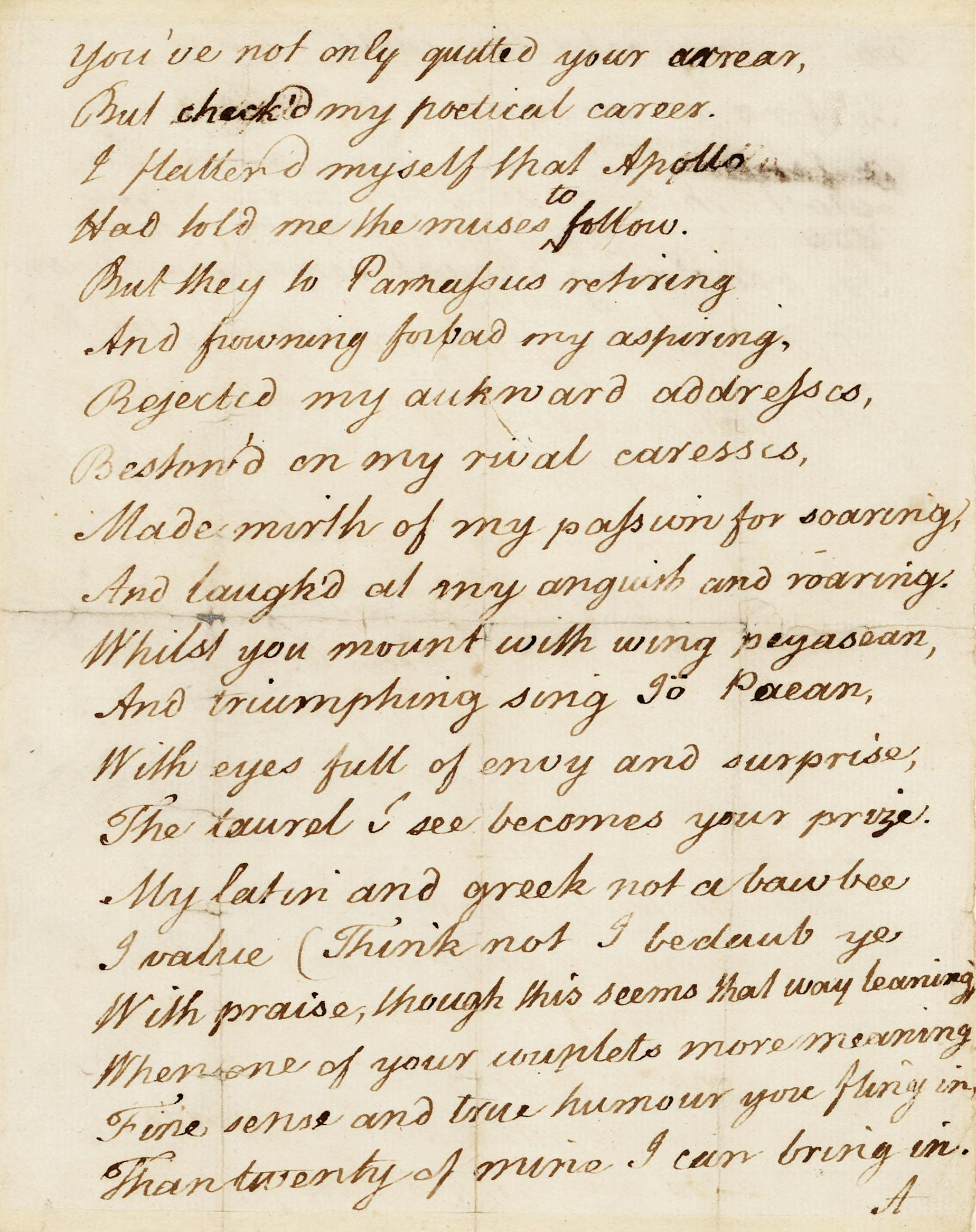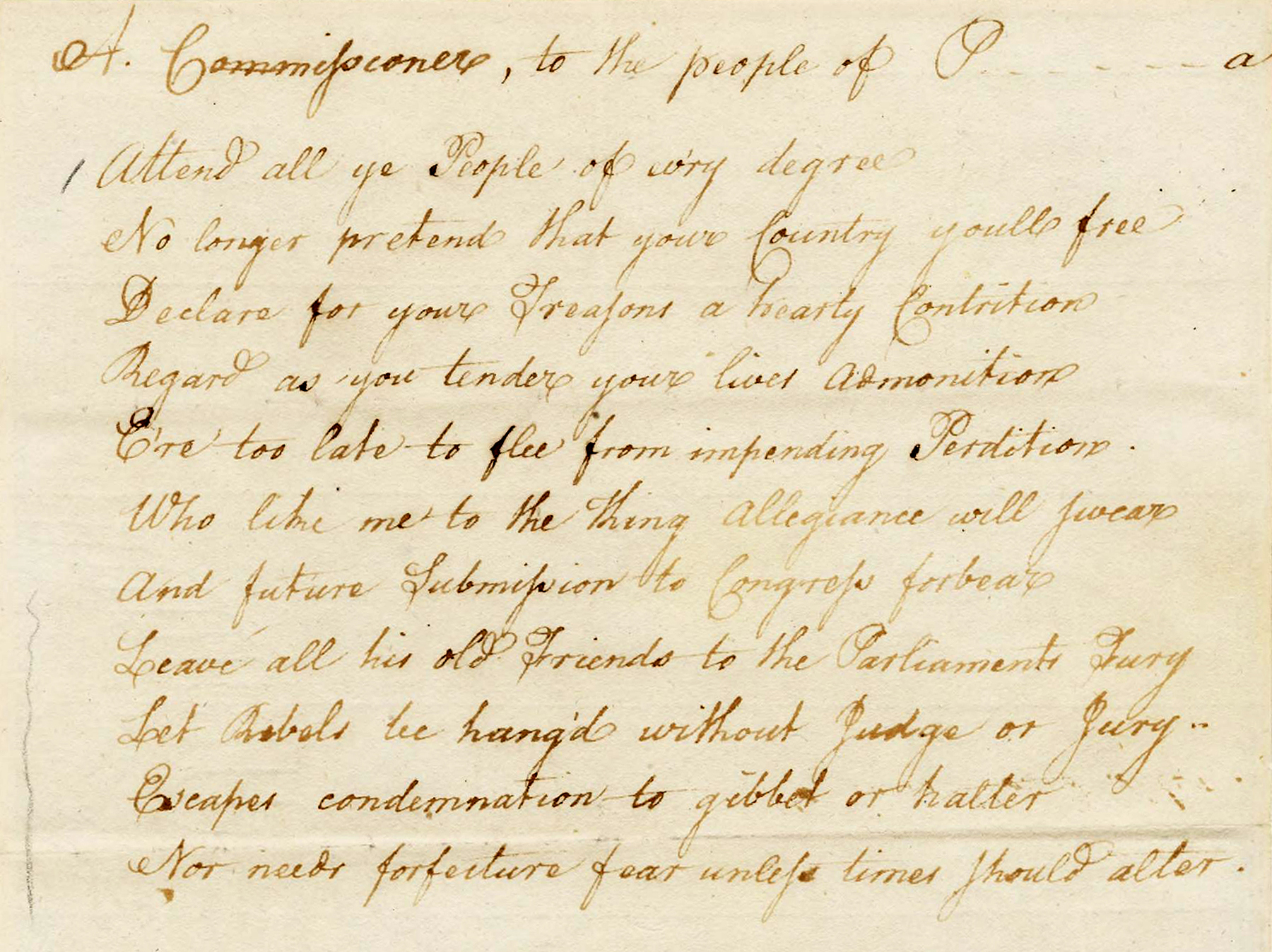Difference between revisions of "Poems on Witty Subjects in Congress"
| Line 119: | Line 119: | ||
==="Epigram," by William Ellery=== | ==="Epigram," by William Ellery=== | ||
| − | + | {| | |
| − | + | |- style="vertical-align: top;" | |
| − | |||
| − | |||
| − | |||
| − | |||
| | | | ||
| + | {| | ||
| + | | style="width: 550px; white-space: nowrap; margin: 20px 0 20px 20px; background-color: #f9f7e0; border: 1px solid #000000; padding: 20px 50px;" | | ||
Like a Babbler ambitious of some little fame<br /> | Like a Babbler ambitious of some little fame<br /> | ||
I follow when Freeman hath started the Game,<br /> | I follow when Freeman hath started the Game,<br /> | ||
| Line 133: | Line 131: | ||
I ask but this Book to be classed with his Friends. | I ask but this Book to be classed with his Friends. | ||
<div align="right">W. E.</div> | <div align="right">W. E.</div> | ||
| + | |} | ||
| + | | | ||
| + | [[File:PoemsOnWittySubjectsInCongressP11.jpg|thumb|550px|Page eleven from [https://archive.org/details/poemsonwittysubj00elle ''Poems on Witty Subjects in Congress,''] from the [https://www.bpl.org/ Boston Public Library's] [https://archive.org/details/bplscarwm American Revolutionary War Manuscripts] collection.]] | ||
|} | |} | ||
==="Answer to Epigram," by George Wythe=== | ==="Answer to Epigram," by George Wythe=== | ||
| − | + | {| | |
| − | + | |- style="vertical-align: top;" | |
| − | |||
| − | |||
| − | |||
| − | |||
| | | | ||
| + | {| | ||
| + | | style="width: 550px; white-space: nowrap; margin: 20px 0 20px 20px; background-color: #f9f7e0; border: 1px solid #000000; padding: 20px 50px;" | | ||
With one epigram, though well hit off,<br /> | With one epigram, though well hit off,<br /> | ||
You must not expect, sir, to get off.<br /> | You must not expect, sir, to get off.<br /> | ||
| Line 160: | Line 159: | ||
If who's the author, dubitatur?<br /> | If who's the author, dubitatur?<br /> | ||
He's your correspondent, Nugator.<ref>Jester, clown.</ref> | He's your correspondent, Nugator.<ref>Jester, clown.</ref> | ||
| + | |} | ||
| + | | | ||
| + | [[File:PoemsOnWittySubjectsInCongressP21.jpg|thumb|550px|Page twenty-one from [https://archive.org/details/poemsonwittysubj00elle ''Poems on Witty Subjects in Congress,''] from the [https://www.bpl.org/ Boston Public Library's] [https://archive.org/details/bplscarwm American Revolutionary War Manuscripts] collection.]] | ||
|} | |} | ||
Revision as of 10:13, 15 April 2014
George Wythe and Willam Ellery, "Poems on Witty Subjects in Congress," American Revolutionary War Manuscripts Collection, Boston Public Library, MS.Ch.E.8.31-33.[1]
Contents
- 1 Manuscript text, November-December 1776
- 1.1 "A Member of the Antinovanglian Faction to W. E.," by George Wythe (VA)
- 1.2 "A Novanglican to G.W.," by William Ellery (RI)
- 1.3 "Instead of Controlling Our Mary's Cross Humor," by William Ellery
- 1.4 "For Farms in Utopia, the Moon, or Some Fairyland," by George Wythe
- 1.5 "Epigram," by William Ellery
- 1.6 "Answer to Epigram," by George Wythe
- 1.7 "Unless You Will Take One Line for Your Ten," by William Ellery
- 1.8 "You've Not only Quitted Your Arrear," by George Wythe
- 1.9 "A Commissioner, to the People of Philadelphia," by William Ellery
- 2 See also
- 3 References
- 4 External links
Manuscript text, November-December 1776
"A Member of the Antinovanglian Faction to W. E.," by George Wythe (VA)
|
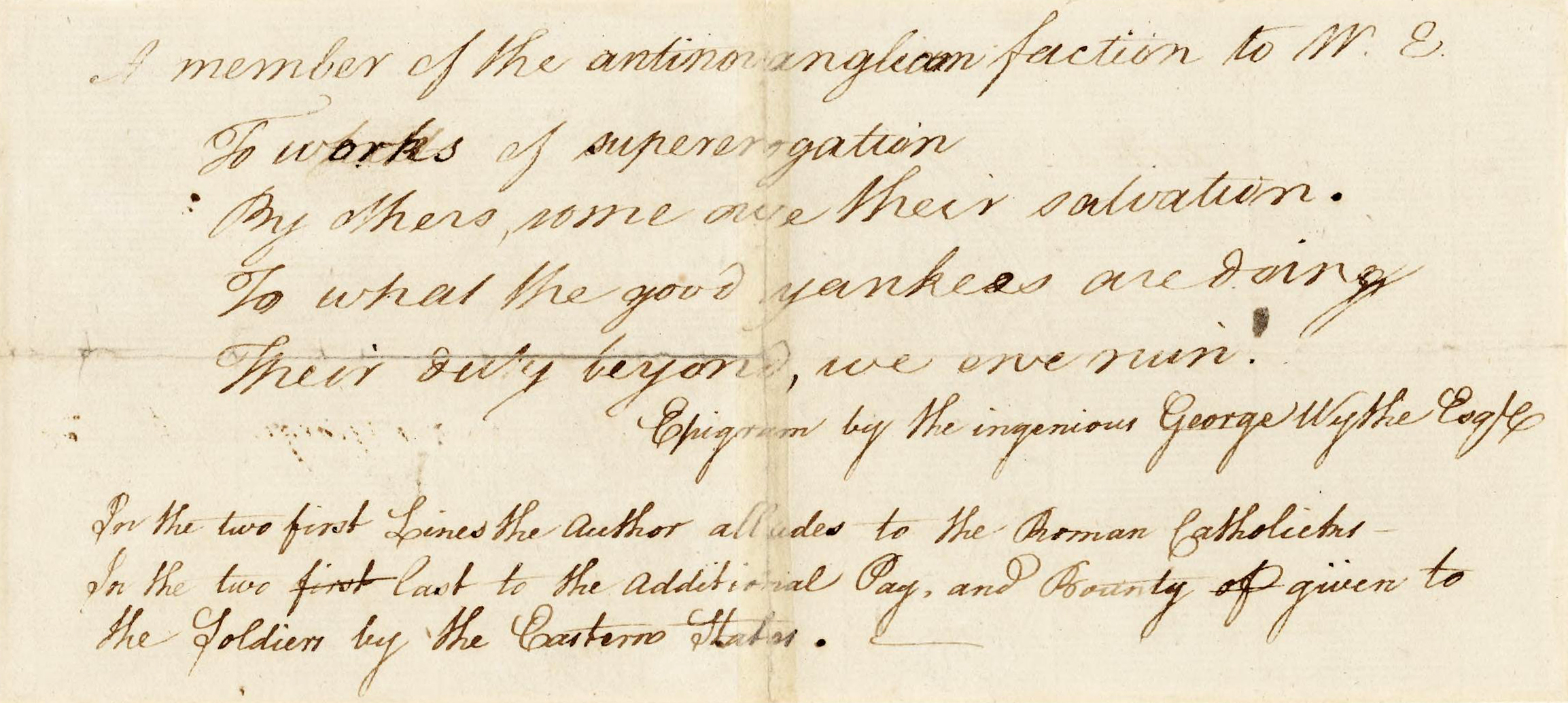 Page seven from Poems on Witty Subjects in Congress, from the Boston Public Library's American Revolutionary War Manuscripts collection. |
"A Novanglican to G.W.," by William Ellery (RI)
|
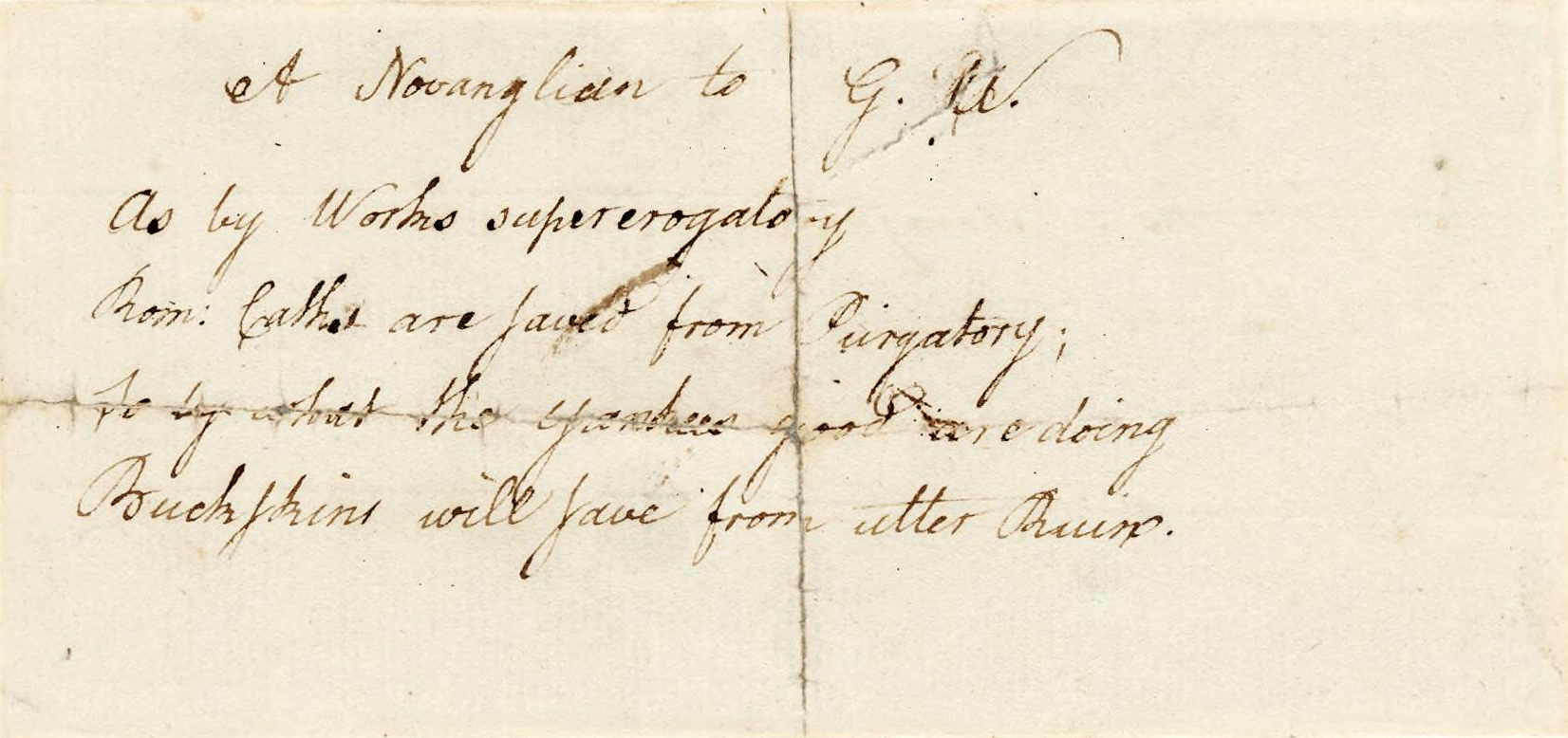 Page three from Poems on Witty Subjects in Congress, from the Boston Public Library's American Revolutionary War Manuscripts collection. |
"Instead of Controlling Our Mary's Cross Humor," by William Ellery
|
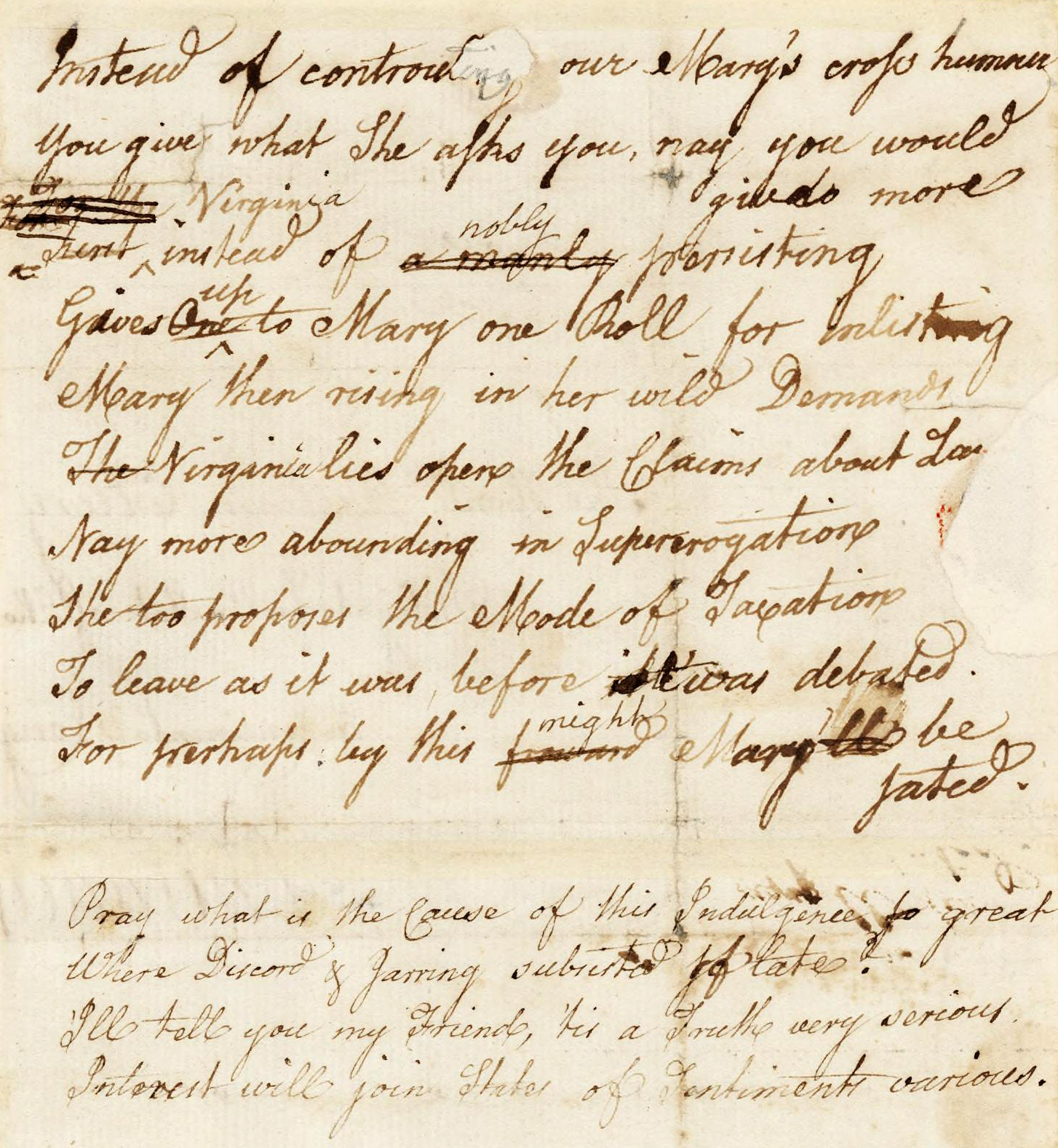 Page five from Poems on Witty Subjects in Congress, from the Boston Public Library's American Revolutionary War Manuscripts collection. |
"For Farms in Utopia, the Moon, or Some Fairyland," by George Wythe
|
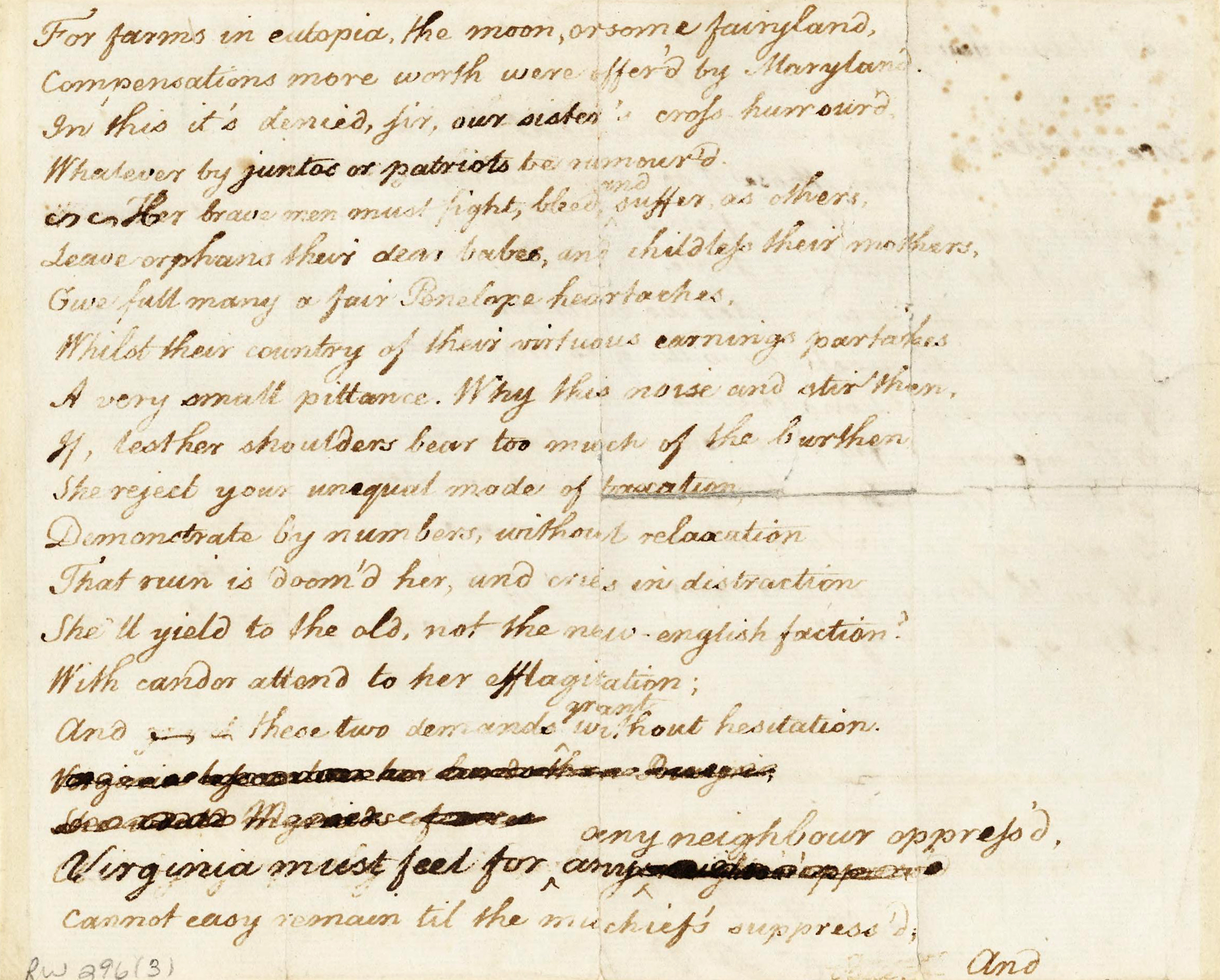 Page nine from Poems on Witty Subjects in Congress, from the Boston Public Library's American Revolutionary War Manuscripts collection. | |
|
And if slaves you include in your capitation, |
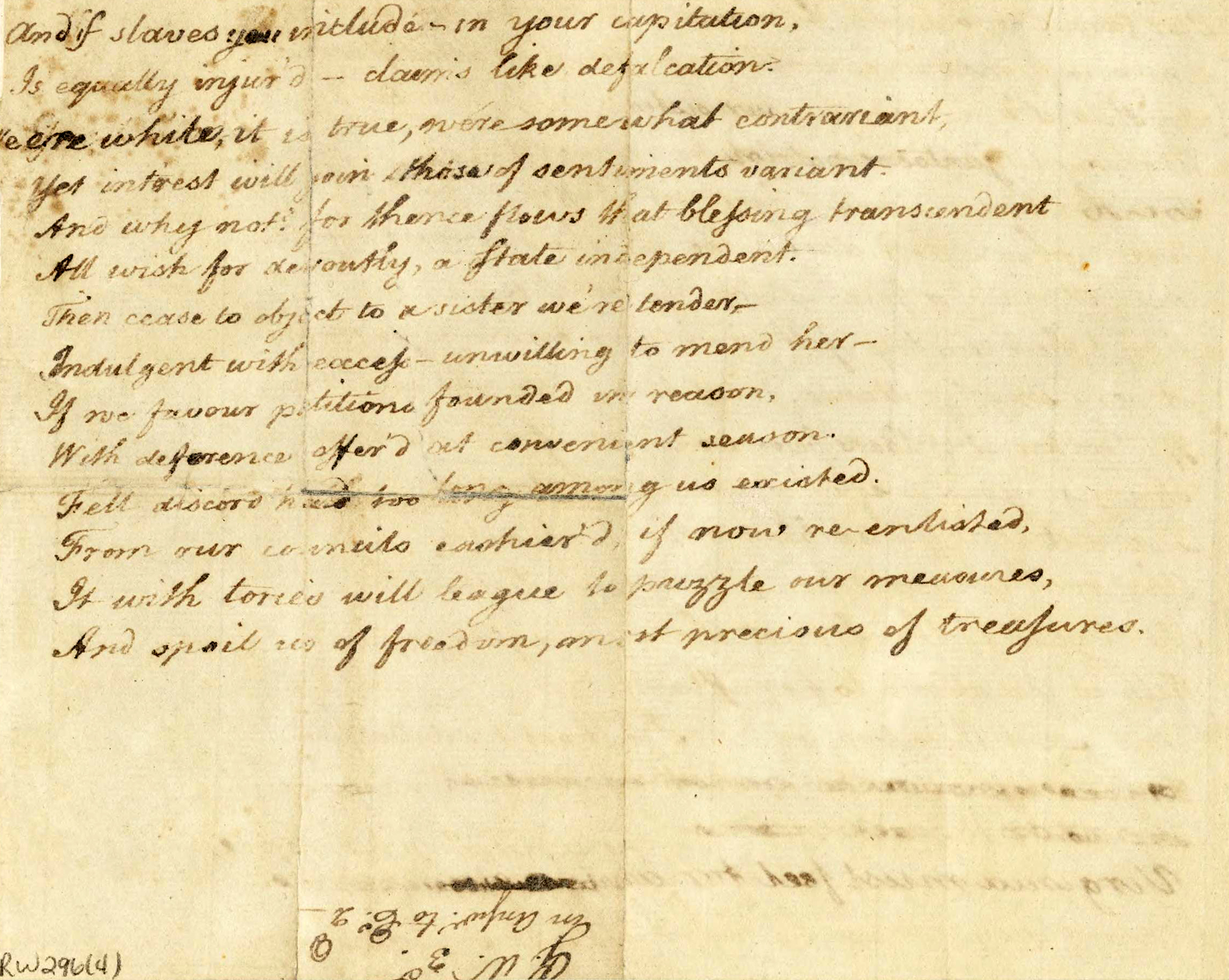 Page ten from Poems on Witty Subjects in Congress, from the Boston Public Library's American Revolutionary War Manuscripts collection. |
"Epigram," by William Ellery
|
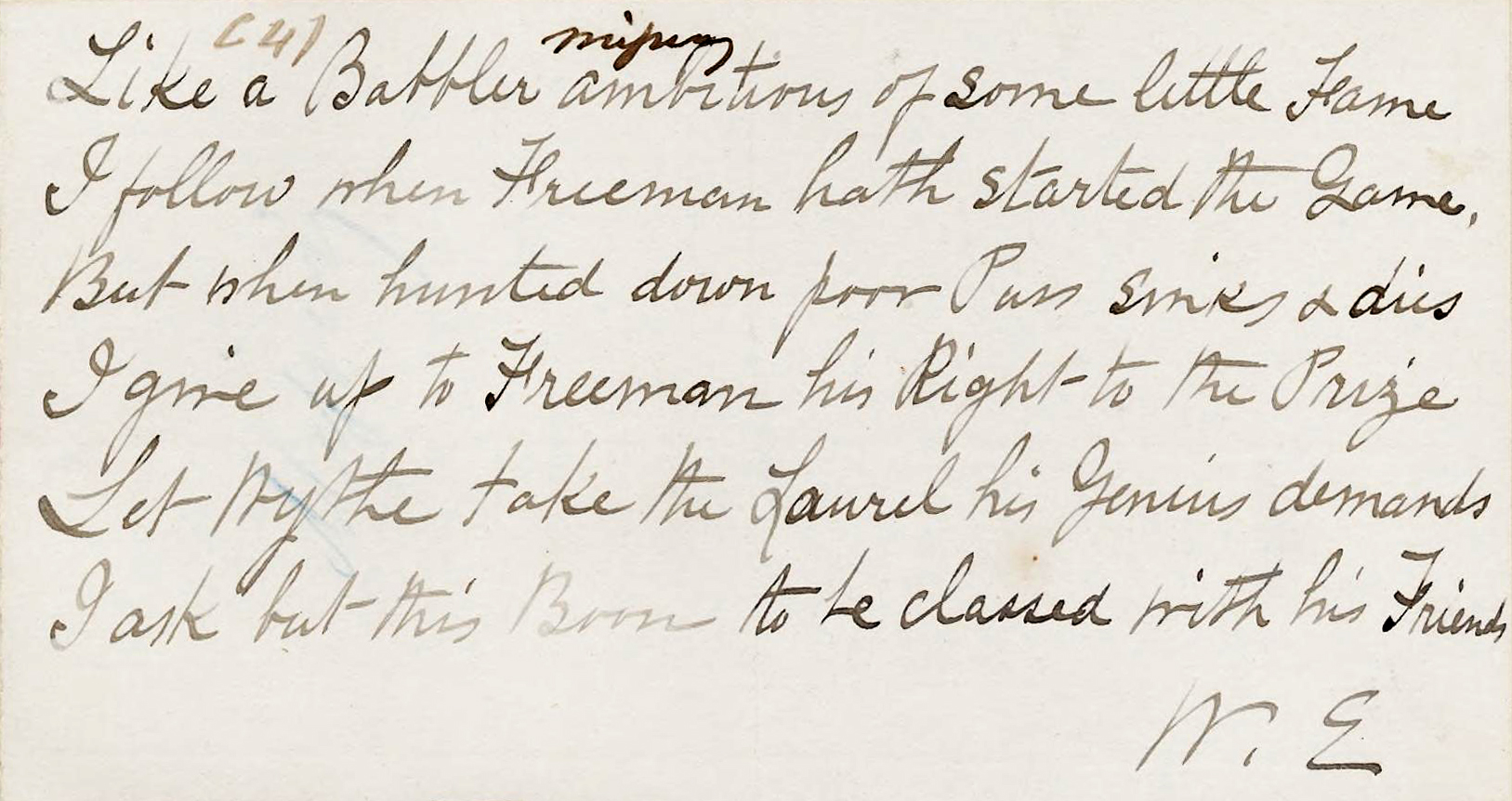 Page eleven from Poems on Witty Subjects in Congress, from the Boston Public Library's American Revolutionary War Manuscripts collection. |
"Answer to Epigram," by George Wythe
|
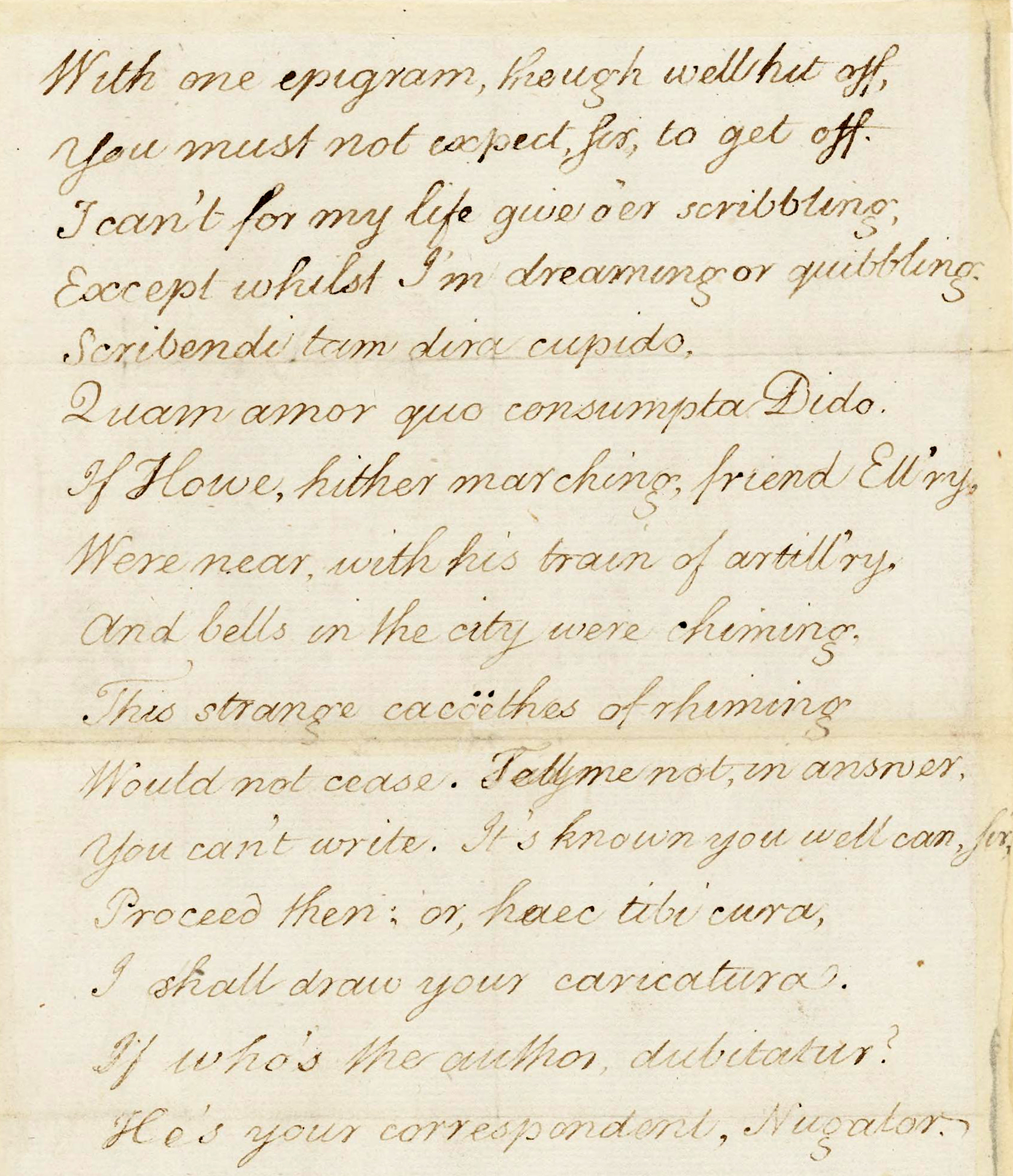 Page twenty-one from Poems on Witty Subjects in Congress, from the Boston Public Library's American Revolutionary War Manuscripts collection. |
"Unless You Will Take One Line for Your Ten," by William Ellery
Page twenty-three from Poems on Witty Subjects in Congress, from the Boston Public Library's American Revolutionary War Manuscripts collection.
|
Unless you will take one Line for your Ten |
"You've Not only Quitted Your Arrear," by George Wythe
Page fifteen from Poems on Witty Subjects in Congress, from the Boston Public Library's American Revolutionary War Manuscripts collection.
|
You've not only quitted your arrear |
"A Commissioner, to the People of Philadelphia," by William Ellery
First page from Poems on Witty Subjects in Congress, from the Boston Public Library's American Revolutionary War Manuscripts collection.
Attend all ye People of wry degree |
See also
References
- ↑ See W. Edwin Hemphill, "George Wythe Courts the Muses," William and Mary Quarterly 3rd ser., 9, no. 3 (July 1952), 338-345.
- ↑ "Novanglian": New Englander.
- ↑ "Dire desire to write," paraphrase of Virgil, Aeneid, Book V, line 721.
- ↑ "The love which consumed Dido," Queen of Carthage.
- ↑ Ovid, Ex Ponto III, xxxvi.
- ↑ Jester, clown.
- ↑ Defy nature, literally "go against Minerva's will." Cicero, De Officiis, I, 31, 110.
- ↑ Wythe is a Virginian Cicero: [[wikipedia:Marcus Tullius Cicero|]].
- ↑ A great law of Nature.
- ↑ Classical Greek cry of exultation or triumph, traditionally addressed to Apollo the healer.
External links
- Boston Public Library, Special Collections.
- American Revolutionary War Manuscripts at the Boston Public Library, Internet Archive.
- Read these poems in the Internet Archive.
